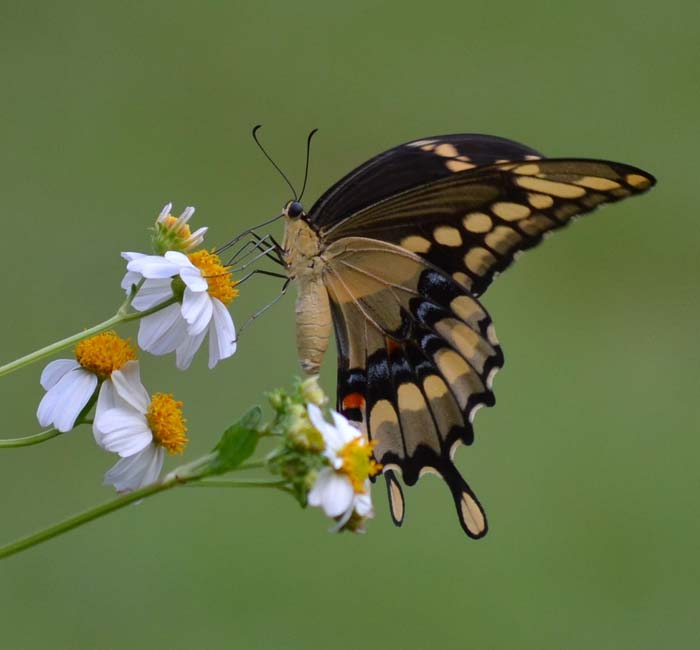Great Pollinator Census coming to Cherokee Pollinator Garden
Published 4:56 pm Monday, August 16, 2021

- giant swallowtail underwing
The Great Georgia Pollinator Census will be celebrated at Cherokee Pollinator Garden, Thomasville’s beautiful community butterfly garden, on August 21 from 10 a.m. to 1 pm. Cherokee Pollinator Garden is near Covington Ave., at Cherokee Lake Park, adjoining the Rose Garden. Please park in the Rose Garden parking lot and walk across the Rose Garden toward the woods, following signs to the butterfly garden on the far side of the driveway.
Visitors are welcome to just enjoy the garden and wildlife, with guides, displays, and handouts available. Special guests and guides will be Sally and Dean Jue from the Tallahassee Hairstreak Chapter of the North American Butterfly Association. They know every butterfly and much more. Native plants will be available for a donation for the garden. And, if visitors want to, they can participate in the statewide Pollinator Census.
The Pollinator Census website is ggapc.org. If you want to participate in the count, go there and read their information and instructions. You will be asked to count the pollinators on one plant for 15 minutes, divided into categories butterflies and moths, carpenter bees, honey bees, bumble bees, small bees, wasps, flies, and other insects.
They provide clear instructions on how to distinguish the different groups. There will be copies of their forms at the event. There will be many signs identifying plants, or you can ask one of the volunteers.
The garden consists of a 2500 square foot section in the sun, shaped like a butterfly (you can see it on Google Earth!), another sunny area on the hillside, and a lovely woods with a new walking trail.
Butterflies and most other pollinators need not only plants that provide nectar and pollen for the adults, but also host plants to lay their eggs on and for their larvae to eat. Most host plants are native, plants that are natural here, not brought in or modified by humans. The pollinators cannot reproduce without them and there is much specialization. For example monarch butterflies must have milkweed species to lay their eggs on, and Gulf fritillaries, zebra longwings, Julias, and variegated fritillaries require passionvine. Cherokee Pollinator Garden emphasizes native plants and includes very few non-natives.
The garden is maintained by volunteers from Friends of Lost Creek Forest, with support from City of Thomasville staff coordinated by Brian Allensworth. The city has proved signs, a bench, city mulch, pine straw, and other support. Lead volunteers Beth Grant and Yvonne Stinson are very dedicated to educating the public about the importance of native plants. They encourage everyone to protect the native trees and other plants that they have and concentrate on planting native plants, preferably straight natives and not cultivars, which are bred to please humans and do not support wildlife as well and may be infused with pesticides that will kill the pollinators. Insects depend on native plants, and all the other creatures in the web of life depend on native plants and insects for life and reproduction. To have nature in yards, along roadsides, in parks, in the countryside, the best thing is to protect and plant natives. Native trees are the very best host plants, so you want to protect and care for them especially. Native oaks, cherries, and willows support the most butterflies and moths.
Stinson and Grant could not maintain the gardens without many individual, family, group and school volunteers. Hands on Thomas County is a very much appreciated resource connecting volunteers with the garden. For example, the lovely new walking trail was established with long dedicated volunteers referred by HOTC, young women missionaries of the Church of Jesus Christ of the Latter-Day Saints, who helped with the garden weekly for almost a year.
Anyone of any age is welcome to help, most Saturday mornings from about 9 a.m. to 12 noon. Come and go for as short or long a time as you would like to. Little kids are welcome! Children under 16 need to be accompanied by an adult. To get email reminders, contact bethgrant@bellsouth.net.
The University of Georgia is sponsoring the Great Georgia Pollinator Census to interest and educate the public about the essential services of pollinators for all of the natural world and many crops, to encourage citizens to protect or add to sustainable pollinator habitat across Georgia, and to produce useful data about pollinator populations.
Most fruits and vegetables and nuts require insect pollination, and recent research shows much of this is done by native pollinators, not just by the human imported and raised European honeybees. About 15 years ago, it was discovered that much of cotton pollination is done by a small native wasp, which was being killed by pesticides.
The main diet of baby birds are caterpillars. No native plants, very few caterpillars. Not enough caterpillars, no baby birds! So part of the natural rhythms of the garden include predation by birds, predatory insects, spiders and other animals.
It is also very important to eliminate exotic invasive plants, that take the resources needed by the natives and often crowd them out.
You are welcome to come any day to enjoy the butterfly garden! Be sure to walk all around it, and enjoy the cool woods and the new trail! There is almost always something different blooming and many interesting and odd insects to observe. You may even see hummingbirds nectaring, pollinating, chasing tiny prey, or fussing with each other!





